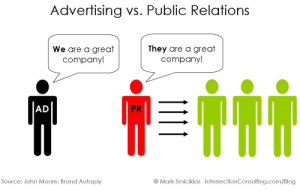By Joy Ehonwa

Fresh graduates searching for a career, and entrepreneurs trying to promote their fledgling business, often have questions about public relations and advertising. These two very different industries are frequently confused as being one and the same. The emergence of the “Public Relations and Advertising Agency” (an attempt at Integrated Marketing Communications) doesn’t help matters in this regard.
The following are seven points that just scratch the surface of the numerous dissimilarities between advertising and public relations.
1. Free Coverage vs Paid Space
The public relations executive’s job is to get free publicity for the company or for his client; news mentions by the media for which they are not paid. By setting up press conferences, writing press releases and hosting media parleys, he focuses on establishing good rapport with relevant press people, and getting free media exposure for the company/client.
In advertising on the other hand, the company pays for advert space, and knows when exactly that advert will air or be published.
2. Control
The public relations practitioner has no creative control over how the media presents the information supplied; if they decide to use it at all. The media is under no obligation to cover an event, or to publish a press release just because it was sent to them.
In advertising, because the client is paying for ad space, he has creative control over what goes into that advert, down to the very last detail.
3. Consumer Perception
When looking at an advert, consumers know that a company is trying to “sell” a product or service, and they receive the message guardedly. Conversely, PR helps generate third-party ‘endorsement’ by independent media sources, thereby creating credibility. When someone reads an article written by someone with no affiliation to your company, or views objective coverage of your event on TV, they know you didn’t pay for it, and they view it in a different light than advertising.
4. Shelf Life
An advert generally has a longer shelf life than one press release. Whereas a PR executive can only submit a press release about a new product once, adverts can be run over and over, for as long as the company’s budget allows. A company can even buy advertising space for the same advert to run every day for a week or even months, but an editor won’t publish your same press release three or four times in their paper or magazine.
5. Different Creative Energies
Advertising executives exercise their creativity by putting togetheradvertising campaigns and material. Creative sessions to come up with attractive newspaper adverts, catchy radio jingles and inspiring TV commercials are the norm in advertising agencies.
In public relations, your creativity is exercised in the way you organize and present your company’s information to the media as newsworthy, the way you are able to generate and sustain buzz through that news, and very importantly, your crisis control skills when it comes time to save your client or company’s integrity and keep scandal from escalating.
6. Special Events: Let’s say your company, as part of their corporate social responsibility, renovates a school, provides a community with pipe borne water, or sponsors an event. Would you take out an advert praising yourselves for being such a great company? No, you wouldn’t overtly blow your trumpet that way. Instead, your PR people package it as news. They send out a press release, which the media will pick up. Beyond publishing the information, they may even cover the event and report it.
7. Writing Style: A young graduate who recognizes that they have a way with words may say, “I want a career in PR and/or Advertising.” However, many do not realize that the writing style required for successful advertising, would be out of place in PR.
An advertising copywriter is free to exercise his creativity in putting together ad campaigns and materials. Phrases like, “Act now!”, “Call us today!” or “Only the best will do for you” are all things you can say in an advertisement, to inspire consumers to buy your product.
In Public Relations however, you’re writing in a strictly no-nonsense news format. Any obvious commercial messages in your communications will be disregarded by the media.
So there you have it; it’s up to you to decide which career path suits you better, or which communication approach meets the needs of your business best.

